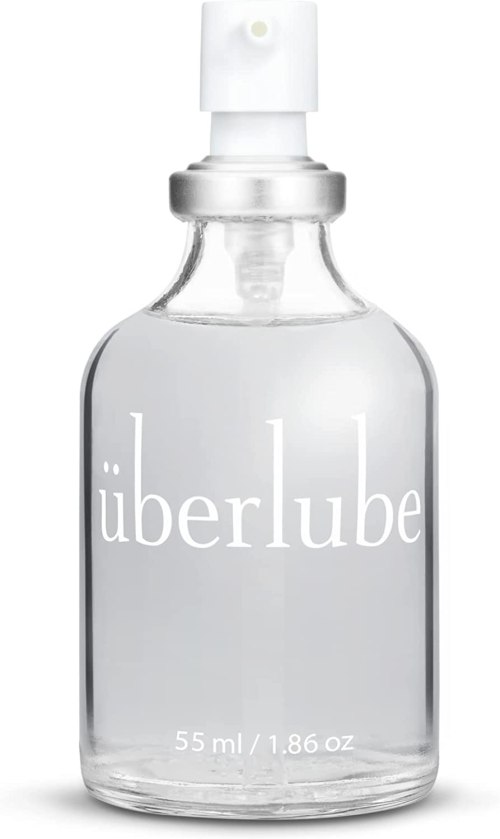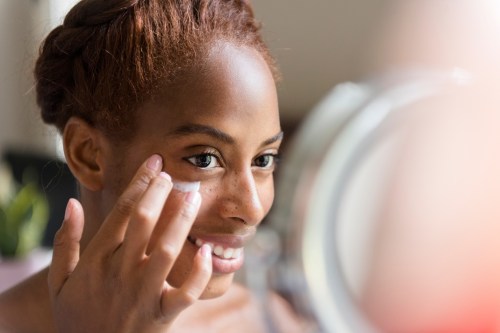Our editors independently select these products. Making a purchase through our links may earn Well+Good a commission
Ever since puberty hit me like a freight train in middle school, my “thick” thighs have been the star of the show. And this summer, thanks to a seemingly-endless heat wave, they’ve been put through the ringer with redness and irritation caused by chafing. I’ve tried several different remedies— chafe sticks, deodorants, body oils, you name it— all of which only gave me a few hours of sweet relief before the discomfort set in again.
While hunting for a better solution, I came across a post in a curvy-girl fashion inspo Facebook group in which a fellow plus-sized babe recommended—wait for it—silicone sexual lubricant.
Years ago, I worked as a sales associate at an upscale adult toy and entertainment boutique, and with that job, I gained a wealth of knowledge surrounding lube… but I had never before thought to repurpose it as an anti-chafe gel. Reading the recommendation gave me a serious “Aha!” moment, because in theory, all of the characteristics of silicone lube should make it the perfect solution for thigh chafing. But would it actually work? To find out, I had to try it for myself.
The benefits of using silicone lube for thigh chafing
Silicone lube is a super-slippery sexual lubricant made up of synthetic silicone polymers, like dimethicone. It’s known for its staying power, and has historically been a favorite for longer sex sessions. Considering longevity is arguably the most important factor when it comes to finding an effective anti-chafe solution, this is a major benefit. Silicone lube won’t sink into skin, and has the ability to maintain its slip until you decide to wash it off with soap and water.
Unlike water-based lubes, which dissolve in water and are quickly rendered useless after coming into contact with H2O, silicone lube can hold up when exposed to water—so in theory, these types of formulas should stay slick in the midst of a whole lot of inner thigh sweat.
“Silicone lube is a good option to use for thigh chafing,” confirms Reid Maclellan, MD, director of Proactive Dermatology Group and founder of skincare brand Cortina. “It can act like a buffer between the skin to stop any discomfort, friction, and irritation.”
UberLube Silicone Lubricant — $20.00
Things to consider before tying silicone lube for chafing
1. It could cause an allergic reaction
Before you use silicone lube as a chafing solution (or in any other capacity), Dr. Maclellan notes that you want to rule out any sort of silicone allergy. Even a mild allergic reaction could cause irritation, which is the last thing you’d want for your already-sensitized skin.
“People should steer clear of silicone lube for thigh chafing if they are allergic to silicone-based products,” says Maclellan. “It can cause a rash and further irritate the skin.”
If a silicone allergy bars you from trying this chafing hack, fear not; there’s a plethora of other tried-and-true non-silicone products that can help nip your thigh chafing in the bud. Maclellan specifically recommends lathering up in petroleum jelly as an alternative.
“The American Academy of Dermatology recommends using petroleum jelly such as vaseline to prevent chafing,” he says. “In addition, wearing longer shorts also can prevent skin-on-skin contact.”
2. It could stain your clothes
Another thing to consider when using silicone lube for thigh chafing is that it could potentially stain your clothes, especially if you’re wearing longer bottoms. While a little staining isn’t the end of the world, it’s something worth being aware of.
If you do end up with a mark on your clothes, simply apply your favorite stain remover directly to the stain before washing as you normally would.
3. It won’t disappear until you wash it off
Silicone is meant to last. Unlike deodorant or thigh chafe sticks that rub into your skin over time, silicone lube will sit on top of your skin until it’s physically washed away with soap and water. If you are particularly sensitive to the feeling of having something on your skin for prolonged periods of time, this might not be the hack for you.
What happened when I tried it
The task was simple—pick a day in which my thighs would be rubbing together for hours on end, and see if silicone lube can be the unsung thigh chafing hero my online gal pals say it is. I decided to try out UberLube Silicone Lubricant ($20), a customer favorite at my aforementioned adult boutique gig. Free of scents, flavors, and harmful additives, UberLube is non-sticky, OBGYN-recommended, and a great option for sensitive-skinned folks like me.
I decided to slick my thighs with silicone lube on a particularly jam-packed Saturday with my best girlfriend. Our plans for the day included walking the aisles at our local farmer’s market in the morning, catching some rays by my family’s pool in the afternoon, and rallying for a concert downtown in the late evening.
And let me just say: After 24 super-sweaty hours, the results blew me away.
1. It lasted all day
Even though I carried the lube around with me all day as a precaution, I didn’t feel the need to reapply often—the slipperiness stayed all throughout our hours-long walk around the farmer’s market. Even after a dip in the pool, I could still feel the slick texture of the lube, but decided to rub it off with a beach towel and slap on a fresh coat before moving through the rest of my day. Other than that, the rumors were true: This stuff lasts.
2. There was no redness or irritation
My biggest complaint about deodorants and thigh chafe sticks is that they aren’t slippery enough. An hour or two after I apply them, my thighs start to catch on each other, which causes instant redness and irritation. With Uberlube, this simply didn’t happen—my thighs were gliding with ease all day long. Plus, since UberLube is free of irritation-causing scents and flavors, my sensitive skin left the experiment unscathed.
3. My thighs felt soft and supple
Perhaps the biggest (and most unexpected) bonus of this experiment was that my skin felt extra-soft by the time I washed off the lube. There were no red bumps or tears, which was partly because of how slick my thighs were, but could also be attributed to the skin-soothing vitamin E in UberLube’s formula.
All in all, silicone lube is the first product that has ever actually worked to keep my chafing at bay. While I’m still open to trying the next hot product that promises to end inner thigh discomfort, I will be reaching for my UberLube for the foreseeable future.
Sign Up for Our Daily Newsletter
Get all the latest in wellness, trends, food, fitness, beauty, and more delivered right to your inbox.
Got it, you've been added to our email list.









